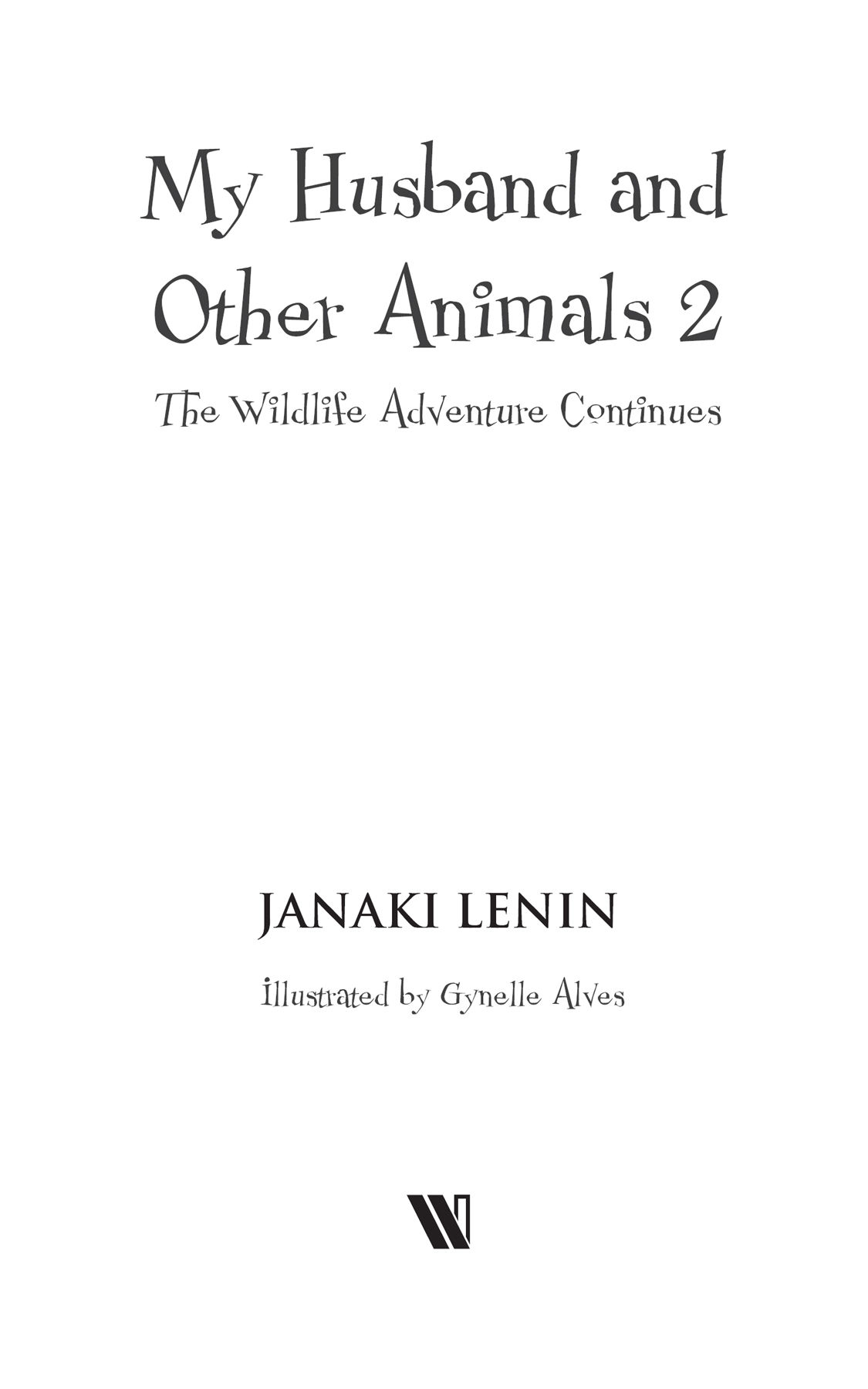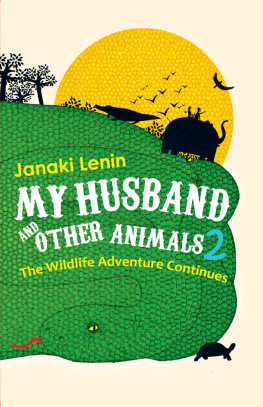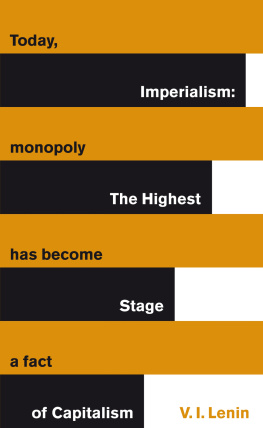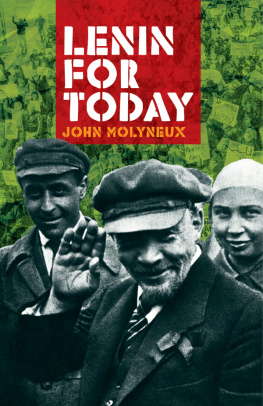Lenin - My Husband and Other Animals 2
Here you can read online Lenin - My Husband and Other Animals 2 full text of the book (entire story) in english for free. Download pdf and epub, get meaning, cover and reviews about this ebook. year: 2018, publisher: Westland, genre: Detective and thriller. Description of the work, (preface) as well as reviews are available. Best literature library LitArk.com created for fans of good reading and offers a wide selection of genres:
Romance novel
Science fiction
Adventure
Detective
Science
History
Home and family
Prose
Art
Politics
Computer
Non-fiction
Religion
Business
Children
Humor
Choose a favorite category and find really read worthwhile books. Enjoy immersion in the world of imagination, feel the emotions of the characters or learn something new for yourself, make an fascinating discovery.
- Book:My Husband and Other Animals 2
- Author:
- Publisher:Westland
- Genre:
- Year:2018
- Rating:5 / 5
- Favourites:Add to favourites
- Your mark:
- 100
- 1
- 2
- 3
- 4
- 5
My Husband and Other Animals 2: summary, description and annotation
We offer to read an annotation, description, summary or preface (depends on what the author of the book "My Husband and Other Animals 2" wrote himself). If you haven't found the necessary information about the book — write in the comments, we will try to find it.
Lenin: author's other books
Who wrote My Husband and Other Animals 2? Find out the surname, the name of the author of the book and a list of all author's works by series.
My Husband and Other Animals 2 — read online for free the complete book (whole text) full work
Below is the text of the book, divided by pages. System saving the place of the last page read, allows you to conveniently read the book "My Husband and Other Animals 2" online for free, without having to search again every time where you left off. Put a bookmark, and you can go to the page where you finished reading at any time.
Font size:
Interval:
Bookmark:
JANAKI LENIN writes about a quarter century of adventures with animals while living with snakeman Rom Whitaker. She examines the behaviour of humans with the same droll perspective. Janaki and Rom live on a farm with Momo, Burru, Amba, and Chola (dogs), Neelakanta (emu), and Luppy (pig).

First published by Westland Publications Private Limited in 2018
61, 2nd Floor, Silverline Building, Alapakkam Main Road, Maduravoyal, Chennai 600095
Westland and the Westland logo are the trademarks of Westland Publications Private Limited, or its affiliates.
Text Copyright Janaki Lenin, 2018
ISBN: 9789386850928
The views and opinions expressed in this work are the authors own and the facts are as reported by her/him, and the publisher is in no way liable for the same.
All rights reserved
Typeset by Ram Das Lal, New Delhi, NCR
No part of this book may be reproduced, or stored in a retrieval system, or transmitted in any form or by any means, electronic, mechanical, photocopying, recording, or otherwise, without express written permission of the publisher.
Contents
Janaki, who is my Pistola , is captivated by the creatures we share life with, from our pack of dogs to wild king cobras. She experiences them in ways I tend to miss, opening up new vistas of animal smarts and behaviour. Ever since our local leopard took centre stage, sharpening our senses, weve been pulled into deeper communion with the jackals, porcupines, civet cats, monkeys, birds, reptiles, trees, plants and insects that share our farm.
Weve lived here at Pambukudivanam for 20 years now and many are the trees we planted that you cant put your arms around. Orioles, treepies, woodpeckers, kingfishers, spotted owlets and parakeets also call it home, and the resident ratsnake regularly sheds his 7-foot-long skin below the expansive banyan tree shading our house. Indian eagle owls hoot each evening from Karadi Malai, the forested hill in front of us and in the early morning sun the pair of booted eagles soar.
While others might be happy to just watch these creatures, Janaki goes many steps further. Her fixation with animal poop for example is in another league: is that rat shit or frog shit on the kitchen counter, lets wash the leopard scat and see what hes been eating, and could that mysterious animal that left the ant-filled dump have been a pangolin?
All my life Ive been a reptile nut, and for the first decade of our lives together, Janaki joined me in my pursuits as herpetologist, filmmaker, and communicator. Perhaps tiring of my single-track mind, she struck out on her own, making friends with professionals who study mammals, birds and insects. Her stories are drawn from tracking these field biologists, our own adventures, and her deep fascination with the natural world.
Janaki weaves our travels to the Agumbe rainforest, Andaman islands, Assam and other locales into a wonderful magic-carpet ride. Shes also prone to disappearing down the proverbial rabbit hole in the quest for answers: why didnt the fishing cat make it down to south India (or did it?) and how the hell do oystercatchers teach their young to shuck oysters and clams? Until she finds answers, shes as restless as a mama cat with her kittens.
These stories are mostly taken from her four-year-long string for The Hindu and share some similarities with the earlier volume, but here she also waxes scientific. She balances animal tales with personal stories such as how we met Falling in Love and how we became partners Marriages are Made on Earth and some serious pieces like Why do Men Rape, and An Appeal to Nature , and Why Did Homosexuality Evolve that have deep insights into human behaviour.
In the best tradition of the Indian snack called mixture, this collection has equal parts of the whimsical, serious, tragic, and hilarious.
Romulus Whitaker
Pambukudivanam
20 October 2017
W hen the first volume of My Husband and Other Animals was published, I asked a friend for marketing advice. Her first question was, Have you written about tigers?
No, I havent.
Although the friend moved on to other questions, I imagine others will ask me the same thing.
A shiver of excitement runs through friends when they describe their encounters with tigers. For many, the sight of a large cat striding regally down a forest path is what sparks their lifelong interest in wildlife. My interest in animals was, however, ignited in the backyard of my parents home in the city.
When I met Rom, he showed me cobras in neighbouring rice fields, monitor lizards in rock piles, and chameleons on trees near pump houses. During the monsoon, we visited seasonal ponds in casuarina plantations along the coast near the Madras Crocodile Bank to see frogs and toads. If the season was right, we spent hours on the beach watching the waves glow with the eerie blue-green luminescence of plankton. What is nature; what is the wild confuse me. On winter nights, trees flashed with the courtship displays of thousands of fireflies. After experiences such as these, questions such as What is nature; where is the wild? confuse me.
Rom took me to forests, too, but to the wettest ones where rare snakes, lizards, and frogs live. The chances of seeing a tiger there were very low. We also spent a lot of time in the Andaman Islands where there are no tigers. We were not interested in the forests of central India for a simple reason: they may be great for tigers, but not for the creatures we sought.
I finally saw my first tiger in Bandipur, in 2005, on a family holiday. We didnt see enough of it to say we saw a tiger, but neither could we say we saw nothing. The news reached the hotel ahead of us, and everyone greeted us as if we had seen Brad Pitt and Salman Khan, hand-in-hand. I dont remember anyone expressing as much excitement when Rom and I watched the glorious spectacle of a pair of big male king cobras wrestling for a full two hours.
A few years after the visit to Bandipur, we travelled to Bandhavgarh. Rom was to present a short movie showcasing Indias chief wildlife tourism assetthe tiger. When someone spotted the striped cat, word went out, and safari jeeps raced down dirt roads, eager to get their clients there before the animal moved. Not unlike how poachers operate, I imagine.
The forest department conducted tiger shows. Tame elephants cornered a tiger in an inaccessible spot, and for a price, tourists were taken on elephant-back to see the obviously bored cat. It wasnt a wildlife park so much as an open-air zoo experience. Unlike many of the other creatures for whom we waited hours and hours and made numerous journeys into the forest before being blessed with a sight, here tigers materialized as instantly as they do on television. It didnt have the quality of a wildlife documentary as much as a wildlife Big Brother .
Outside the park, we saw sarus cranes fling their heads up in the air and call raucously as they danced in fallow wheat fields. The birds seemed freer than those poor tigers imprisoned in the wild.
I dont deny the tiger is a magnificent animal, but it has also become a commodityfor hunters, conservationists, poachers, tourists, entrepreneurs, photographers, researchers, rheumatic Chinese, and for countless writersfor a long time.
When you read the adventures of big-game hunters in Africa or Asia, there is invariably a menacing mamba or an aggressive cobra they dispatch to prove their machismo. In my writing career, I naturally correct this imbalance by giving snakes and other less charismatic animals their rightful place in the galaxy of wildlife stars. Now you see why I dont write about tigers. I hope readers will forgive my bloody-mindedness!
Next pageFont size:
Interval:
Bookmark:
Similar books «My Husband and Other Animals 2»
Look at similar books to My Husband and Other Animals 2. We have selected literature similar in name and meaning in the hope of providing readers with more options to find new, interesting, not yet read works.
Discussion, reviews of the book My Husband and Other Animals 2 and just readers' own opinions. Leave your comments, write what you think about the work, its meaning or the main characters. Specify what exactly you liked and what you didn't like, and why you think so.












